C语言格式化字符串漏洞实验
格式化字符串漏洞实验
在线实验环境: 格式化字符串漏洞实验
一、 实验描述
格式化字符串漏洞是由像printf(user_input)这样的代码引起的,其中user_input是用户输入的数据,具有Set-UID root权限的这类程序在运行的时候,printf语句将会变得非常危险,因为它可能会导致下面的结果:
- 使得程序崩溃
- 任意一块内存读取数据
- 修改任意一块内存里的数据
最后一种结果是非常危险的,因为它允许用户修改set-UID root程序内部变量的值,从而改变这些程序的行为。
本实验将会提供一个具有格式化漏洞的程序,我们将制定一个计划来探索这些漏洞。
二、实验预备知识讲解
2.1 什么是格式化字符串?
printf ("The magic number is: %d", 1911);
试观察运行以上语句,会发现字符串"The magic number is: %d"中的格式符%d被参数(1911)替换,因此输出变成了“The magic number is: 1911”。 格式化字符串大致就是这么一回事啦。
除了表示十进制数的%d,还有不少其他形式的格式符,一起来认识一下吧~
| 格式符 | 含义 | 含义(英) | 传 |
|---|---|---|---|
| %d | 十进制数(int) | decimal | 值 |
| %u | 无符号十进制数 (unsigned int) | unsigned decimal | 值 |
| %x | 十六进制数 (unsigned int) | hexadecimal | 值 |
| %s | 字符串 ((const) (unsigned) char *) | string | 引用(指针) |
| %n | %n符号以前输入的字符数量 (* int) | number of bytes written so far | 引用(指针) |
( * %n 的使用将在1.5节中做出说明)
2.2 栈与格式化字符串
格式化函数的行为由格式化字符串控制,printf函数从栈上取得参数。
printf ("a has value %d, b has value %d, c is at address: %08x/n",a, b, &c);
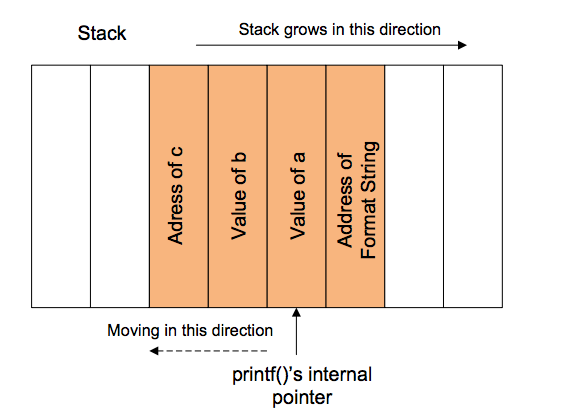
2.3 如果参数数量不匹配会发生什么?
如果只有一个不匹配会发生什么?
printf ("a has value %d, b has value %d, c is at address: %08x/n",a, b);
- 在上面的例子中格式字符串需要3个参数,但程序只提供了2个。
- 该程序能够通过编译么?
- printf()是一个参数长度可变函数。因此,仅仅看参数数量是看不出问题的。
- 为了查出不匹配,编译器需要了解printf()的运行机制,然而编译器通常不做这类分析。
- 有些时候,格式字符串并不是一个常量字符串,它在程序运行期间生成(比如用户输入),因此,编译器无法发现不匹配。
- 那么printf()函数自身能检测到不匹配么?
- printf()从栈上取得参数,如果格式字符串需要3个参数,它会从栈上取3个,除非栈被标记了边界,printf()并不知道自己是否会用完提供的所有参数。
- 既然没有那样的边界标记。printf()会持续从栈上抓取数据,在一个参数数量不匹配的例子中,它会抓取到一些不属于该函数调用到的数据。
- 如果有人特意准备数据让printf抓取会发生什么呢?
2.4 访问任意位置内存
- 我们需要得到一段数据的内存地址,但我们无法修改代码,供我们使用的只有格式字符串。
- 如果我们调用 printf(%s) 时没有指明内存地址, 那么目标地址就可以通过printf函数,在栈上的任意位置获取。printf函数维护一个初始栈指针,所以能够得到所有参数在栈中的位置
- 观察: 格式字符串位于栈上. 如果我们可以把目标地址编码进格式字符串,那样目标地址也会存在于栈上,在接下来的例子里,格式字符串将保存在栈上的缓冲区中。
int main(int argc, char *argv[])
{
char user_input[100];
... ... /* other variable definitions and statements */
scanf("%s", user_input); /* getting a string from user */
printf(user_input); /* Vulnerable place */
return 0;
}
-
如果我们让printf函数得到格式字符串中的目标内存地址 (该地址也存在于栈上), 我们就可以访问该地址.
printf ("/x10/x01/x48/x08 %x %x %x %x %s"); -
/x10/x01/x48/x08 是目标地址的四个字节, 在C语言中, /x10 告诉编译器将一个16进制数0x10放于当前位置(占1字节)。如果去掉前缀/x10就相当于两个ascii字符1和0了,这就不是我们所期望的结果了。
- %x 导致栈指针向格式字符串的方向移动(参考1.2节)
- 下图解释了攻击方式,如果用户输入中包含了以下格式字符串
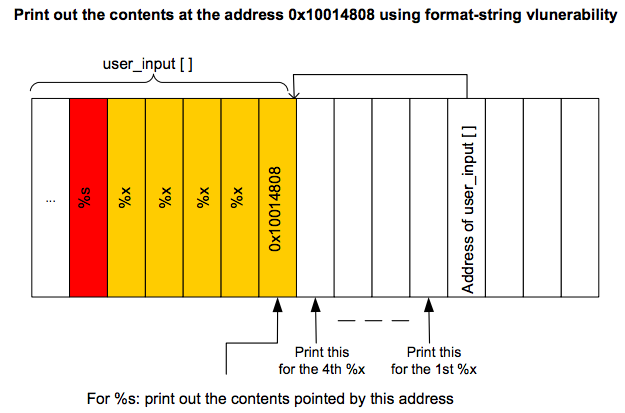
- 如图所示,我们使用四个%x来移动printf函数的栈指针到我们存储格式字符串的位置,一旦到了目标位置,我们使用%s来打印,它会打印位于地址0x10014808的内容,因为是将其作为字符串来处理,所以会一直打印到结束符为止。
- user_input数组到传给printf函数参数的地址之间的栈空间不是为了printf函数准备的。但是,因为程序本身存在格式字符串漏洞,所以printf会把这段内存当作传入的参数来匹配%x。
- 最大的挑战就是想方设法找出printf函数栈指针(函数取参地址)到user_input数组的这一段距离是多少,这段距离决定了你需要在%s之前输入多少个%x。
2.5 在内存中写一个数字
%n: 该符号前输入的字符数量会被存储到对应的参数中去
int i;
printf ("12345%n", &i);
- 数字5(%n前的字符数量)将会被写入i 中
- 运用同样的方法在访问任意地址内存的时候,我们可以将一个数字写入指定的内存中。只要将上一小节(1.4)的%s替换成%n就能够覆盖0x10014808的内容。
- 利用这个方法,攻击者可以做以下事情:
- 重写程序标识控制访问权限
- 重写栈或者函数等等的返回地址
- 然而,写入的值是由%n之前的字符数量决定的。真的有办法能够写入任意数值么?
- 用最古老的计数方式, 为了写1000,就填充1000个字符吧。
- 为了防止过长的格式字符串,我们可以使用一个宽度指定的格式指示器。(比如(%0数字x)就会左填充预期数量的0符号)
三、 实验内容
用户需要输入一段数据,数据保存在user_input数组中,程序会使用printf函数打印数据内容,并且该程序以root权限运行。更加可喜的是,这个程序存在一个格式化漏洞。让我们来看看利用这些漏洞可以搞些什么破坏。
程序说明:
程序内存中存在两个秘密值,我们想要知道这两个值,但发现无法通过读二进制代码的方式来获取它们(实验中为了简单起见,硬编码这些秘密值为0x44和0x55)。尽管我们不知道它们的值,但要得到它们的内存地址倒不是特别困难,因为对大多数系统而言,每次运行程序,这些内存地址基本上是不变的。实验假设我们已经知道了这些内存地址,为了达到这个目的,程序特意为我们打出了这些地址。
有了这些前提以后我们需要达到以下目标:
- 找出secret[1]的值
- 修改secret[1]的值
- 修改secret[1]为期望值
注意:因为实验环境是64位系统,所以需要使用%016llx才能读取整个字。但为了简便起见,对程序进行了修改了,使用%08x也能完成实验。
有了之前预备知识的铺垫,先自己尝试一下,祝玩的愉快:)
程序如下:
/* vul_prog.c */
#include <stdlib.h>
#include <stdio.h>
#define SECRET1 0x44
#define SECRET2 0x55
int main(int argc, char *argv[])
{
char user_input[100];
int *secret;
long int_input;
int a, b, c, d; /* other variables, not used here.*/
/* The secret value is stored on the heap */
secret = (int *) malloc(2*sizeof(int));
/* getting the secret */
secret[0] = SECRET1; secret[1] = SECRET2;
printf("The variable secret's address is 0x%8x (on stack)/n", &secret);
printf("The variable secret's value is 0x%8x (on heap)/n", secret);
printf("secret[0]'s address is 0x%8x (on heap)/n", &secret[0]);
printf("secret[1]'s address is 0x%8x (on heap)/n", &secret[1]);
printf("Please enter a decimal integer/n");
scanf("%d", ∫_input); /* getting an input from user */
printf("Please enter a string/n");
scanf("%s", user_input); /* getting a string from user */
/* Vulnerable place */
printf(user_input);
printf("/n");
/* Verify whether your attack is successful */
printf("The original secrets: 0x%x -- 0x%x/n", SECRET1, SECRET2);
printf("The new secrets: 0x%x -- 0x%x/n", secret[0], secret[1]);
return 0;
}
(ps: 编译时可以添加以下参数关掉栈保护。)
gcc -z execstack -fno-stack-protector -o vul_prog vul_prog.c
一点小提示:你会发现secret[0]和secret[1]存在于malloc出的堆上,我们也知道secret的值存在于栈上,如果你想覆盖secret[0]的值,ok,它的地址就在栈上,你完全可以利用格式化字符串的漏洞来达到目的。然而尽管secret[1]就在它的兄弟0的旁边,你还是没办法从栈上获得它的地址,这对你来说构成了一个挑战,因为没有它的地址你怎么利用格式字符串读写呢。但是真的就没招了么?
3.1 找出secret[1]的值
1.首先定位int_input的位置,这样就确认了%s在格式字符串中的位置。 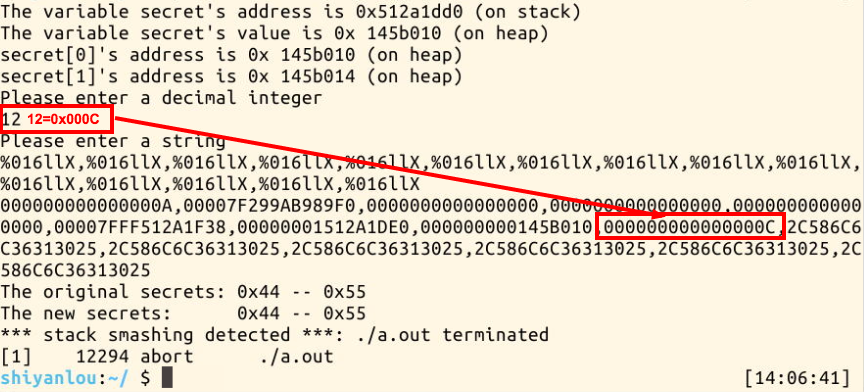
2.输入secret[1]的地址,记得做进制转换,同时在格式字符串中加入%s。 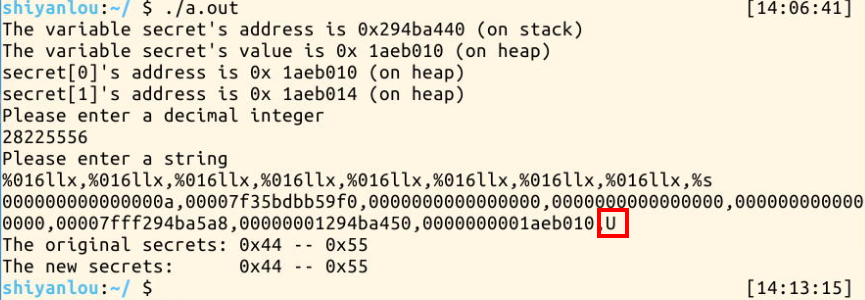
大功告成!U的ascii码就是55。
3.2 修改secret[1]的值
1.只要求修改,不要求改什么?简单!不明白%n用法的可以往前回顾一下。 
大功告成x2!
3.3 修改secret[1]为期望值
1.要改成自己期望的值,咋办?填1000岂不累死?!可以用填充嘛! 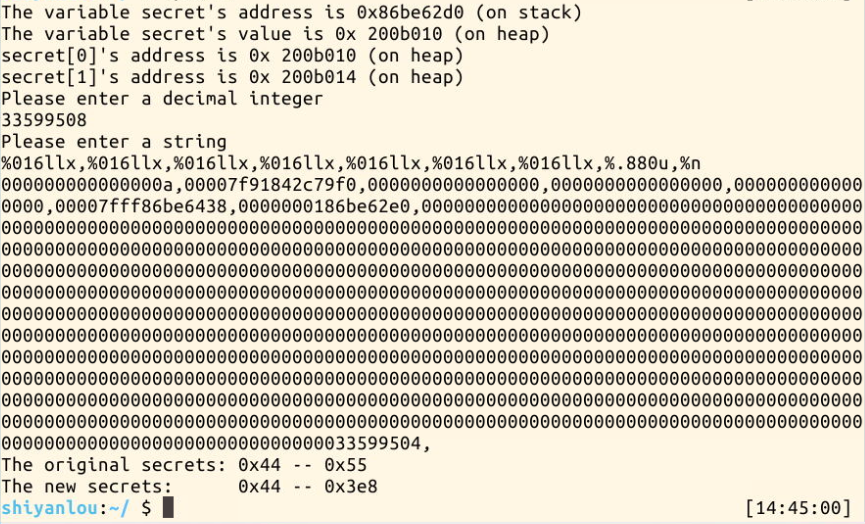 哦对了,0x3e8 = 1000。 大功告成x3!
哦对了,0x3e8 = 1000。 大功告成x3!
四、 练习
在实验楼环境安步骤进行实验,并截图
您已经完成本课程的所有实验, 干的漂亮!
License
本课程所涉及的实验来自 Syracuse SEED labs ,并在此基础上为适配 实验楼 网站环境进行修改,修改后的实验文档仍然遵循GNU Free Documentation License。
本课程文档github链接: https://github.com/shiyanlou/seedlab
附 Syracuse SEED labs 版权声明:
Copyright © 2014 Wenliang Du, Syracuse University. The development of this document is/was funded by the following grants from the US National Science Foundation: No. 1303306 and 1318814. Permission is granted to copy, distribute and/or modify this document under the terms of the GNU Free Documentation License, Version 1.2 or any later version published by the Free Software Foundation. A copy of the license can be found at http://www.gnu.org/licenses/fdl.html .











![[HBLOG]公众号](https://www.liuhaihua.cn/img/qrcode_gzh.jpg)

